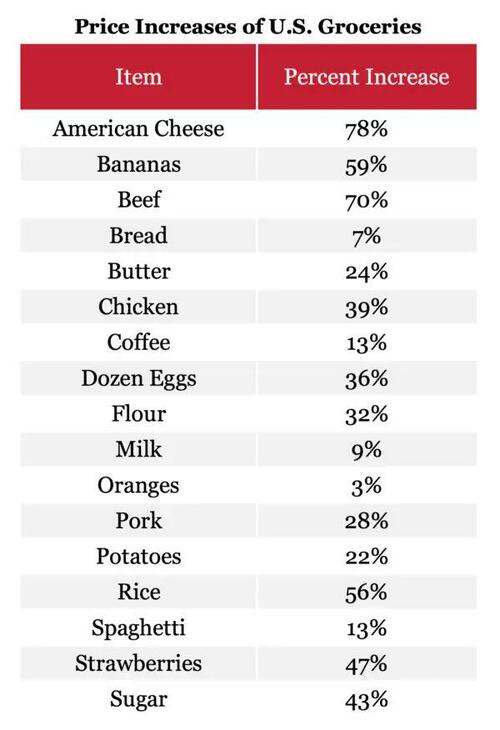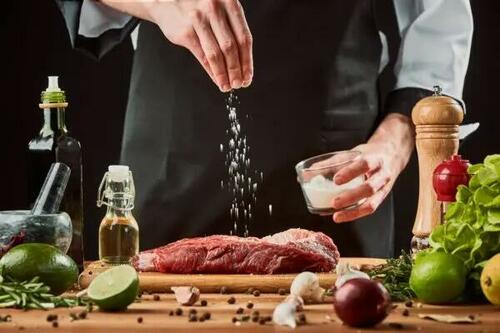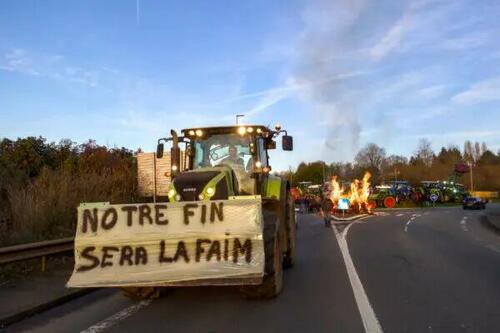
Projected food price increases from net zero policies (Source: The Buckeye Institute)
Posted on 02/15/2024 9:14:19 PM PST by SeekAndFind
As inflation remains stubbornly high, farmers throughout the Western world are warning that cost increases from the net zero movement will drive food prices still higher, while simultaneously putting many smaller farmers out of business.
January inflation numbers showed that prices increased by 3.1 percent over what they were a year ago, indicating that the fight against inflation, while progressing, has not been won.
Overall, prices have surged by nearly 18 percent since January 2021 when President Joe Biden took office.
Americans are struggling in an economy in which, by official statistics, nearly one-fifth of the value of their dollars has evaporated in three years—though many will say the cost of food and other essentials has become more expensive than what the official numbers state.
The U.S. Department of Agriculture (USDA), which tracks food prices, offers an optimistic assessment of the coming year. After having gone up 9.9 percent in 2022, the USDA states, “[food] prices grew more slowly in 2023,” increasing by only 5.8 percent.
“Food prices are expected to continue to decelerate in 2024,” the USDA projects.
While some predict that the worst is behind us, analysts of the U.S. farming industry say there is another round of price inflation in the works, which will come from the Biden administration’s “whole of government” effort to reduce global temperatures.
A recent report by the Buckeye Institute attempts to quantify the cost of Bidenomics to farmers.
The report, titled “Net-Zero Climate-Control Policies Will Fail the Farm,” projects that farmers will see costs rise by at least 34 percent, which will increase the household grocery bill for an American family of four by more than $1,300 per year.
“Complying with net-zero emissions policies and corporate ESG reporting requirements will increase prices of farm inputs, the costs of which will ultimately be passed onto consumers at grocery stores and restaurants,” the report states.
“This is where the left is going, trying to get to net zero,” Rea Hederman, executive director of the Buckeye Institute’s economic research center, told The Epoch Times. And the costs imposed on farmers are in addition to price hikes from inflation, weather, or other factors that typically impact food prices.
“The fact that the federal government printed too much money, this is on top of that,” Mr. Hederman said, “and it’s a sustained increase, not a temporary fluctuation in food prices, because you’re building higher baseline operating costs that are going to be permanent for farmers going forward.”
The report analyzed an average U.S. farm, which is about 700 acres in size, producing corn. It then summed the costs of complying with net zero mandates, as well as price increases on fuel, fertilizer, and other supplies from the various net zero initiatives that are either in place or expected to take effect.
The report projects that the cost base of this farm will escalate from $192,000 to $257,000 as a result. As costs trickle down to consumers, the grocery bill for a family of four would increase from $8,320 to $9,650—a 15 percent increase.
“It’s important for people to understand that when you’re raising costs to farmers, that is being passed on to consumers of food, and some types of food are going to be impacted more,” Mr. Hederman said. “So for example, beef is going to go up more than oranges because if you’re raising the cost of corn, that’s an input to beef, so beef suffers a double whammy.”
The average price of ground beef increased from $3.97 per pound in January 2021 to $5.03 per pound in January 2024, according to Federal Reserve statistics.
Cattle ranchers are struggling not only with higher feed and fuel costs but also drought in many parts of the United States, which has reduced herd size.
According to EPA estimates, agriculture accounted for 10.6 percent of U.S. greenhouse gas emissions in 2021, with the bulk of those emissions coming from livestock and fertilizer.
Projected food price increases from net zero policies (Source: The Buckeye Institute)
Climate activists often oppose animal farming for this reason, and within that category, beef is the number one target. Of all livestock, beef produces the most greenhouse gas emissions and accounts for about 60 percent of all greenhouse gas emissions from farming, studies suggest.
Jais Valeur, CEO of Danish Crown, Europe’s top meat processor, told Denmark’s Berlingske newspaper in 2021 that beef will soon become a luxury because of the emissions from producing it.
“It will be a bit like champagne, namely a luxury product,” Mr. Valeur said. “The beef cattle will be a luxury product that we eat when we need to pamper ourselves.”
Olive oil, salt, and pepper are all you need to make your steak delicious. (Yuriy Golub/Shutterstock)
Many farmers have argued that, while larger corporate farms may be able to weather the additional pricing pressure, net zero policies will be particularly harmful to smaller farms, which will concentrate food production among an ever smaller number of producers.
“Everybody needs food to survive, so farms can pass on a great deal of that cost,” Mr. Hederman said. “But our belief is that family farms, smaller farms, a lot of them will sell out or go out of business because they do not have as much access to capital.”
Farming, with its use of heavy equipment for planting, harvesting, and transportation, is a capital intensive business. It also requires large amounts of working capital to finance the period between planting crops or raising animals, and when produce or livestock can be sold to market.
This has raised concerns that because of the environmental, social, and governance movement (ESG), which has taken hold among many Wall Street financial institutions, banks will start to penalize farms that fail to comply with ESG criteria, including to reduce emissions.
On Jan. 29, agriculture officials from 12 U.S. states sent letters to banks, including JPMorgan Chase, Citibank, Bank of America, Wells Fargo, Goldman Sachs and Morgan Stanley, urging them not to impose net zero criteria on farmers.
The banks are all members of the U.N. Net Zero Banking Alliance (NZBA), which commits members to achieve U.N. net zero goals throughout their loan portfolios.
While these commitments are confirmed on bank websites, a JPMorgan spokesperson told The Epoch Times that “JPMorgan Chase does not have an agriculture emissions intensity reduction target” and that “we make our own banking, lending, and underwriting decisions and don’t relinquish decision-making to third parties.”
In 2016, the Obama administration signed the United States up to the United Nations Paris Climate Accords.
The agreement commits America to cutting its greenhouse gas emissions by 50-52 percent by 2030 and to reach economy-wide net zero emissions by 2050.
In 2017, President Donald Trump withdrew the United States from the agreement.
On President Joe Biden’s first day in office, he recommitted the United States to the Paris Accords.
According to the Buckeye report, the biggest drivers of the current price hikes are the increased cost of fertilizers, many of which are derivatives of natural gas, and the increased cost of diesel and propane.
“After recommitting the United States to the net-zero climate-control agenda, the president and Congress revived significant misguided features of the once-failed ‘Green New Deal’ through the Inflation Reduction Act,” the report states.
This includes using executive orders to restrict oil and natural gas supply, blocking drilling leases on federal lands, canceling pipelines, blocking exports of liquid natural gas, and enacting a Securities Exchange Commission mandate to require audited reports of greenhouse gas emissions, which would apply to farmers.
“These federal initiatives and requirements will prove expensive and economically destructive here—just as they have been in Europe,” the report states.
Europe leads the United States in enacting net zero provisions, and farmers there have been squeezed by rising costs as a result. Farmer protests have erupted throughout Europe over the past year, most recently breaking out in the UK and France, in response to government efforts to cut the use of synthetic fertilizers and clamp down on agricultural CO2 emissions, with the goal of becoming carbon neutral by 2050.
In the face of popular dissent, government officials in Europe have begun to backpedal on their commitment to cut greenhouse gas emissions by 55 percent by 2030, and by 90 percent by 2040.
The European Commission, which is the executive of the European Union, indicated that it would now consider exempting farmers from many of its climate mandates.
“You can look at Europe as the canary in the coal mine,” Mr. Hederman said. “We’re seeing what happens when you drive up fertilizer costs, playing out all over Europe right now.
“European governments are starting to have second thoughts about the draconian nature of the rules they are implementing, because they’re realizing this is not going to be sustainable and because farmers are furious,” he stated.
A slogan which reads "Hunger will be our fate" is displayed on a tractor as farmers block the entrance of a Leclerc supermarket in Le Mans, northwestern France, on Jan. 26, 2024, as part of a nationwide day of protests called by several farmers unions on pay, tax and regulations. Farmers have fumed at what they say is a squeeze on purchase prices for produce by supermarket and industrial buyers, as well as complex environmental regulations. (GUILLAUME SOUVANT/AFP)
As farmers struggle, some climate activists see a solution in food alternatives, such as insect-based and fungi-based foods.
In a 2021 interview with the MIT Technology Review, Microsoft founder Bill Gates discussed developments in laboratory production and scientific modifications to livestock farming. Mr. Gates is an investor in synthetic food manufacturing companies, including Beyond Meat, Impossible Foods, and Upside Foods.
“I don’t think the poorest 80 countries will be eating synthetic meat [but] I do think all rich countries should move to 100 percent synthetic beef,” he said. “You can get used to the taste difference, and the claim is they’re going to make it taste even better over time.”
Porterhouse steak, last week ( it was on sale ) was $9.99 a lb.!
“The Revolution” will kill ya.

Just what we need. Higher food prices.
But maybe our new Chinese friends crossing the border daily will help.
China now owns some farm land in the US.
In U.S. Rep. Mike Collins website he noted: “China owns 384,000 acres of American agricultural land. That’s a 30% increase just since 2019. And on top of that, they own land near an air force base in North Dakota. That’s a clear threat to our national security.”
That beef price may put hamburger stands out of business.
That and wages, who would buy the burgers.
They were created to give us something cheap to eat out.
Not any more...
Look to Asia for our future street vendors ...
insect-based and fungi-based foods, or a spicy bat wing.
or just close your eyes and shove it in.
Just bout everything is edible ... sort of.
hmmmm .... I wonder ... FDP at 24.16 up .36c today.
ketchup ... you heard it here first
Bat wing burger...
Hmmm...
Eat the Bugs, or else....
Did we discover how to make bread without flour?
I noticed that as well. How can flour go up by over a third, butter by a quarter, and eggs by 36%, yet bread increase by less than 10%.
Something doesn’t make much sense here...
>> some climate activists see a solution in food alternatives, such as insect-based and fungi-based foods.
“Climate activists” should be butchered and fed to dogs.
>> Did we discover how to make bread without flour?
Good question.
[crickets]
Where are you? (Roughly)
Ct.!
My guess would be that the bread is the finished product, which required expensive machines and man-hours to produce, which accounts for a lot (most?) of the price of bread. The cost of the raw materials put into the bread is probably(??) a low percentage of the total cost.
The high price for lamb in Ct I understand.
The $10/lb for porterhouse I don’t understand.
We (Central Texas) are paying WAY more for beef than that... and this is cattle country.
I looked into subsidies for bread makers. I didn’t find anything. But I DID find articles on how much the government subsidizes wheat and other crops and produce. No wonder the raw materials are increasing in price - the government is involved!
OOOO ya .... bread without flour
if you think bugs will be good, just wait till you get a nice slice of mid evil ... dark ages... bread.
I won't get all detaily here but just know .... bread has often been made with “other” ingredients.
And the trend is coming back .... it's all cloaked in “enviro friendly” “earf saving” utopia bla bla ... but it will be back .... and you will like it... with your bugs
The price for rib lamb chops is the usual price, and that NEVER goes on sale.
OTOH...because of where we are, lobster ( yes, there ARE lobsters in the ocean off CT.'s coast ) is cheapish, as are musseles and clams.
Disclaimer: Opinions posted on Free Republic are those of the individual posters and do not necessarily represent the opinion of Free Republic or its management. All materials posted herein are protected by copyright law and the exemption for fair use of copyrighted works.